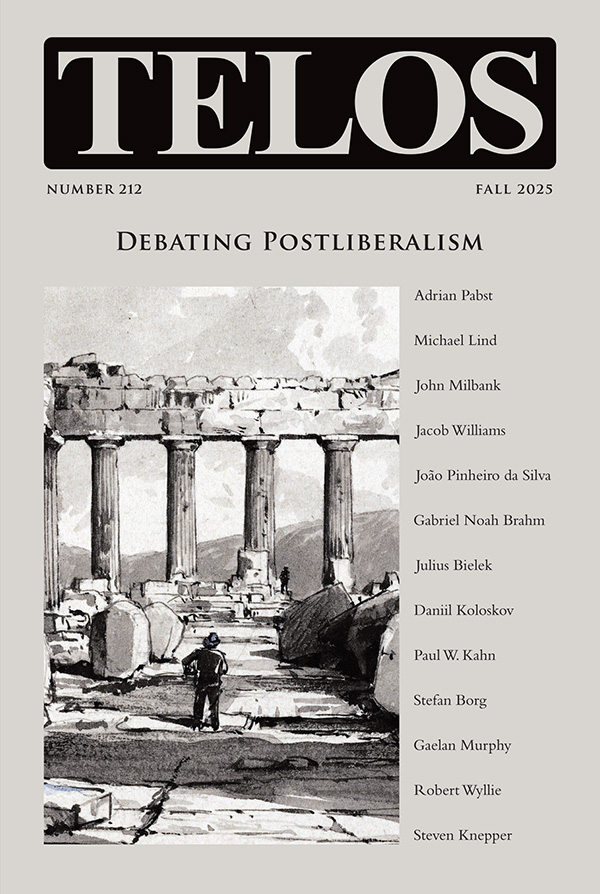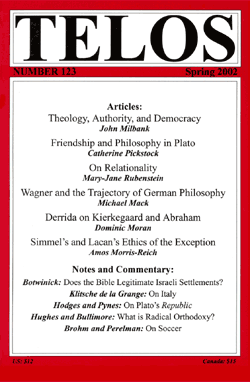 In today’s episode of the Telos Press Podcast, Adrian Pabst talks with Michael Lind and John Milbank about postliberalism, the topic of the current issue of Telos, “Debating Postliberalism.” Adrian Pabst’s “The New Era: What Comes After the Self-Erosion of Liberalism,” Michael Lind’s “After Liberalism,” and John Milbank’s “The Politics of Virtue” all appear in the issue. We have made the articles by Pabst and Lind available as open access publications, and they can be read for free at our website. To purchase a copy of the issue or to subscribe to Telos, visit our online store.
In today’s episode of the Telos Press Podcast, Adrian Pabst talks with Michael Lind and John Milbank about postliberalism, the topic of the current issue of Telos, “Debating Postliberalism.” Adrian Pabst’s “The New Era: What Comes After the Self-Erosion of Liberalism,” Michael Lind’s “After Liberalism,” and John Milbank’s “The Politics of Virtue” all appear in the issue. We have made the articles by Pabst and Lind available as open access publications, and they can be read for free at our website. To purchase a copy of the issue or to subscribe to Telos, visit our online store.
|
Telos 212 (Fall 2025): Debating Postliberalism is now available for purchase in our store. Individual subscriptions to Telos are also available in both print and online formats.
Some political and policy differences notwithstanding, the mainstream left and right—in the United States, Europe, and other Western countries such as Japan, South Korea, Australia, and New Zealand—took a progressive turn and embraced untrammeled markets, hyper-individualism, and foreign military adventures. The ruling elites felt vindicated by the “end of history” utopia of a global convergence toward liberal market democracy and the inevitable forward march of globalization. Both liberal interventionists and neoconservative crusaders advanced the vision of America as a liberal Leviathan that secures the social contract at home and U.S. supremacy abroad. In or Out? Debating Britain’s EU Membership In association with the James Madison Charitable Trust, the Centre for Federal Studies at the University of Kent is organising a series of three seminars entitled “In or Out? Informing the political debate and popular opinion on UK’s EU membership.” These seminars will take place in the run-up to the referendum and focus respectively on the economy, politics, and security.
In their article “What is Radical Orthodoxy?” (Telos 123, Spring 2002), John Hughes and Matthew Bullimore map out, in a short space and yet with crisp detail, the main themes in the Radical Orthodoxy project. For those familiar with the movement, their points will not come as a shock: that a deep metaphysical violence underlies modernity, political liberalism, and capitalism; that the philosophical and theological dualisms of modernity must be named and then overcome with the aid of both premodern and postmodern thought; and that in the face of proliferating violence it is Christian orthodoxy—in line with Aquinas, Boethius, Augustine, Gregory of Nyssa, and Iamblichean Neo-Platonism—that presents truly “radical” alternatives to the prevailing political, philosophical, and theological orders. At this year’s Telos Conference in New York City, Telos Associate Editor Adrian Pabst outlined the theme of the upcoming Telos in Europe Conference, which will be held on September 5–8, in L’Aquila, Italy. This conference will focus on “The Idea of Europe,” and will offer speakers and attendees an opportunity to discuss Europe’s current crisis of identity. For complete details about the conference, as well as the full call for papers, please visit the conference page on the Telos Paul Piccone Institute website, located here. |
||||
|
Privacy Policy · Data Protection Copyright © 2026 Telos Press Publishing · All Rights Reserved |
||||
 Mention “Radical Orthodoxy” in a room of people who are either quite intimately or only remotely acquainted with contemporary theology, and one surely will receive equal parts of praise and scorn. Whether it is being praised or scorned, however, it is plain that Radical Orthodoxy has worked its way deep into the fabric of contemporary theological discourse. Since the publication of John Milbank’s Theology and Social Theory in 1992, Catherine Pickstock’s After Writing in 1997, and Radical Orthodoxy: A New Theology, edited by Milbank, Pickstock, and Graham Ward in 1998, the Radical Orthodoxy movement has done what any explosively innovative intellectual movement will do after the hype settles down: mature or wither away.
Mention “Radical Orthodoxy” in a room of people who are either quite intimately or only remotely acquainted with contemporary theology, and one surely will receive equal parts of praise and scorn. Whether it is being praised or scorned, however, it is plain that Radical Orthodoxy has worked its way deep into the fabric of contemporary theological discourse. Since the publication of John Milbank’s Theology and Social Theory in 1992, Catherine Pickstock’s After Writing in 1997, and Radical Orthodoxy: A New Theology, edited by Milbank, Pickstock, and Graham Ward in 1998, the Radical Orthodoxy movement has done what any explosively innovative intellectual movement will do after the hype settles down: mature or wither away. 

